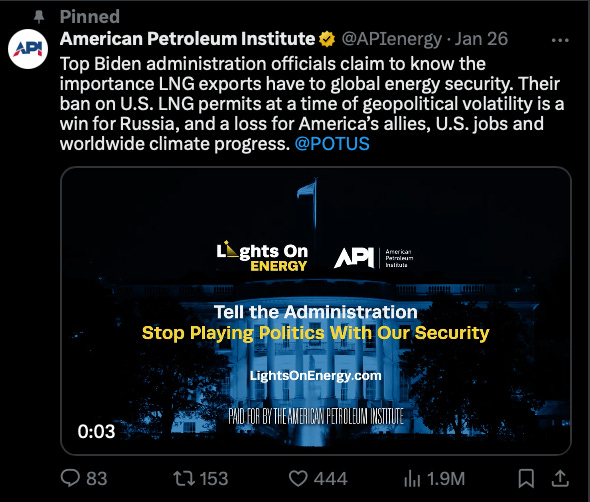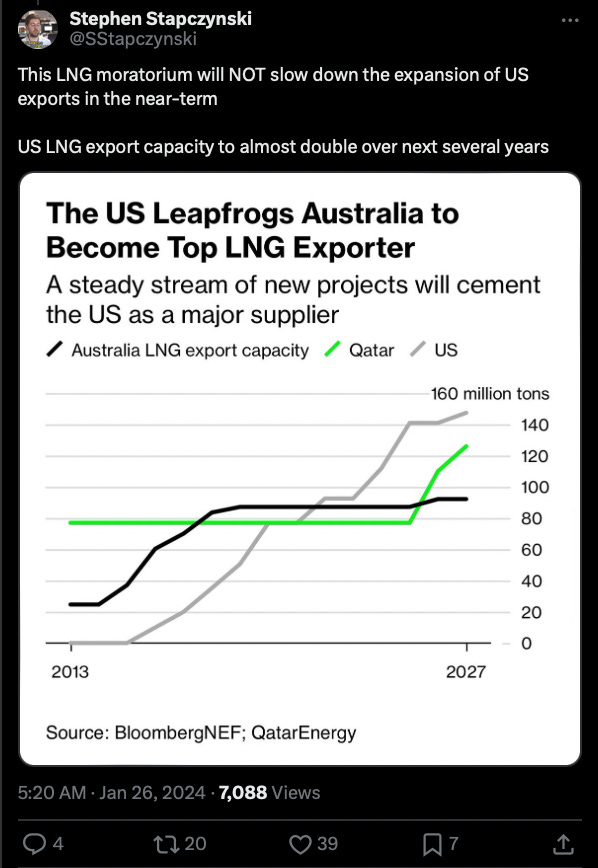Understanding Biden's LNG decision
There's a lot of politically-motivated misinformation floating around about it. Here's what's really happening.
There’s a lot of misinformation floating around about the Biden Administration’s decision on Friday to temporarily pause Department of Energy permit approvals for new liquified natural gas, or LNG, export terminals.
Most of this misinformation is coming from Republicans and the fossil fuel industry, but some Democrats and environmental groups are stretching the truth too. Republicans are fear-mongering about how awful Biden’s decision is for the economy and energy security, and Democrats are exaggerating how great it is for the climate.
The reason each group is overstating the importance of this move is because they want to fire up their respective voter bases. Democrats are trying to motivate progressives to vote for Biden in the upcoming president election, and Republicans want to rage-bait conservatives to vote against him.
It’s all to be expected, but it’s not really helping anyone understand what’s actually happening. So here’s how to understand Biden’s new LNG policy without the political spin.
The reality of Biden’s LNG decision
First thing’s first: The Biden Administration did not block the export of LNG to other countries, nor did he pause the construction of new LNG export facilities.
No existing LNG facility in the U.S. is affected by this decision. The eight existing LNG export terminals around the country will continue to operate. The flow of fossil fuels overseas will continue.
Not only will the flow of U.S. LNG overseas continue—it will massively expand. None of the 10 new LNG export facilities that are already approved by the Department of Energy are affected by Biden’s decision. With these approved and under construction facilities, the volume of U.S. LNG exported to other countries is expected to double by 2028.
Here’s what the Biden Administration actually did: It put a temporary pause on granting Department of Energy approvals for proposed new LNG export facilities.
That’s a bit of a mouthful, which is one reason why you don’t see it in headlines and social media posts. Instead, you see things like, “Biden took action to stop LNG” or “White House makes historic move to block fossil fuels.”
It’s understandable, but those simplified framings can easily give the impression that the White House did more than it actually did. Because the only LNG facilities affected by this policy are the ones that fossil fuel companies have said they are planning to build, but have not yet obtained DOE permits for.
To be sure, this is still a good number of facilities. There are at least six major proposed LNG export terminals affected by the pause. If the Biden administration had not issued this pause, these facilities would have sailed through the normal DOE approval process, and ensured future greenhouse gas emissions equal to 317 coal plants, according to the Guardian.
That’s why climate activists are celebrating, and it’s a good reason. Because now, in response to their pressure, the White House has pledged to revamp the DOE’s permit-granting process to consider the latest and best-available science on climate, economic, and security impacts. That means fossil fuel companies may no longer get automatic, rubber-stamped approved to build new LNG infrastructure in the Gulf of Mexico.
The key word in that last sentence, however, is may. Because the fact is, we still don’t know how long this pause will last, what this new DOE approval process will look like, or how many of the affected projects will be accepted or rejected. As Bloomberg aptly noted on Sunday: “If reelected, Biden might very well allow the process to move forward once safely back in office for another four years.”
For the climate-concerned readers here (which I assume is most of you), I want to emphasize: I’m not laying this out for the purpose of downplaying activists’ accomplishments. I’m laying it out to urge an accurate understanding of what’s happening, and to caution against politically-motivated messaging that implies this fight is over, or that these emissions are guaranteed to never reach the atmosphere.
Yes, a battle has been won—and it’s a battle that never would have seen the light of day under a Trump administration, or any Republican administration. Yes, it is evidence that under Biden, the needle can be moved. And yes, it is probably the most significant thing a U.S. president has ever done to stand up to the fossil fuel industry.
But it is not, as the White House asserted on Friday, an example of “act[ing] with the urgency [the climate crisis] demands to protect the future for generations to come.” That simply has not happened yet. Whether it does happens still remains to be seen. And unless the pressure remains high, it very well may not.
Debunking industry myths about the LNG pause
Now that we’re through all that, let’s debunk a few Republican- and fossil fuel industry-led talking points about Biden’s LNG decision.

Their favorite, by far, is that Biden is weakening energy security in Europe by limiting its supply of U.S. LNG.
This is inaccurate, according to most non-partisan energy analysts. Biden’s pause “likely won’t result in any significant tightening of gas markets,” Bloomberg LNG reporter Stephen Stapczynski tweeted on Monday.
That’s because the LNG terminals affected by Biden’s pause aren’t scheduled to come online until at least 2027. In addition, Stapczynski tweeted that most of the planned LNG from those facilities is expected to go to Asia, not Europe.
A prolonged pause on LNG exports would certainly have some impact on European energy markets. For example, one third of the LNG from the massive CP2 terminal is already contracted to go to Germany, so that means Germany would have to find another source if CP2 is long-delayed.
But CP2 is not scheduled to come online for another three years—and it hasn’t even begun the permit approval process with the Department of Energy yet.
Another major myth being proliferated by the fossil fuel industry and its supporters is that pausing LNG is undermining global climate progress.

Current gas industry employee and former Democratic Senator Mary Landrieu told CNBC on Thursday that Biden’s decision “doesn't make sense from his environmental agenda,” because “Natural gas is part of the solution, not the problem. Natural gas is cleaner than coal. We have reduced emissions 60 percent in the United States from using Natural Gas and renewables. That’s not Mary Landrieu’s opinion. That’s a fact.”
This argument only works if you disregard three facts.
Natural gas and LNG are not the same; exported LNG emits far more because of leaks.
Building out new gas infrastructure delays the deployment of renewables in coal-heavy areas.
The world has an extremely limited amount of time to stabilize a safe climate, which requires reaching net-zero. And you cannot reach net-zero in that time frame with a widespread expansion of methane for energy.
In addition, just because the United States has reduced its emissions using methane gas in the past does not mean that methane gas will reduce emissions now. The emissions problem in the U.S. used to be because of coal, and now it isn’t. Today, the United States still emits a lot—and it’s mostly because of gas. So gas is not going to solve our emissions problem. Our emissions problem today is because of gas.
Another popular myth: Biden’s decision is going to destroy local economies.

The way fossil fuel industry and Republicans are posturing, you’d think Biden’s decision was ripping existing jobs away from hard-working Americans and destroying communities all over the country.
But remember: None of the terminals affected by Biden’s decision have permits to operate, and none are expected to come online for at least three years.
In addition, the claim that the industry is creating “stronger communities” is highly disputed by many of the folks who live in the communities where the industry operates. Our recent interview with James Hiatt, a former refinery worker who lives in Louisiana, speaks to that point:
We already have three LNG terminals [around] Cameron Parish–one that started operating in 2018 and one that started in 2020–and it looks like the hurricane we had in 2020 hit yesterday. There's not even a church. The only people who live in the town are the fishermen who have seen the worst catch they've ever had.
Come look at Cameron, and tell me if this looks like some prosperous economic development, and not extractive profits for somebody from elsewhere. These streets should be paved with gold. But they're not.
Indeed, research reported in October by Floodlight and the Louisiana Illuminator found that “in Louisiana’s majority Black communities in the area known as “Cancer Alley,” … the majority of [industry] jobs go to white workers. Similar disparities occur in minority-dominant communities along Texas’ Gulf Coast, where the majority of workers are white.”
“I would hear the people here say these plants keep coming but they’re not hiring Black people,” retired educator Stephanie Aubert, who is Black and lives in St. John the Baptist Parish, told Floodlight and the Illuminator. “They’ll hire people from outside the parish before they hire us. That’s what they do to us.”
Catch of the Day: Swami Maiananda says: When it gets too hot for you, take a nap under the garden bench.
Thanks to reader Lorraine for the submission.
Want to see your furry (or non-furry!) friend in HEATED? It might take a little while, but we WILL get to yours eventually! Just send a picture and some words to catchoftheday@heated.world.









Thank you for diving into the details. I feel I have a better understanding of the decision.
I can't begin to describe how refreshing it is to read an article that states the simple facts. Thank you! "These things are true, and here's why. These things are not true and here's why."
I took a journalism course years ago; two goals were paramount: truth and objectivity. They've been the gold standard in reporting since people first began writing about what's going on. Bob Woodward, referring to the articles he co-wrote with Carl Bernstein about Watergate, once said that no series of articles in history had received as much scrutiny as theirs, and the conclusion was that except for a very few minor and inconsequential errors, their writing was found to be factual.
What a tragedy that we must resort to discussing the "good old days" regarding factual and objective reporting. I'm so grateful we still have at least one excellent source of information that has not sold her soul to a corporate agenda. So again, thank you!